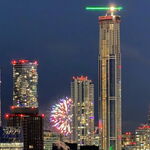Electrify
Senior Member
And it looks like justice was served... /sarcasm
http://www.cbc.ca/news/canada/toronto/story/2013/05/31/g20-trial-police-verdict.html
Lucky for him, this guy's home address appears to be unlisted (either that, or he commutes in from Waterloo...)
G20 officer found not guilty on assault charges
Judge says only eyewitness in case was 'unreliable'
An Ontario Superior Court judge has acquitted Toronto police Const. Glenn Weddell on all assault charges arising from the G20 protests nearly three years ago.
Weddell was charged after Dorian Barton's shoulder was broken on June 26, 2010. Barton alleged that a police officer hit him with a riot shield, knocking him to the ground.
Weddell, the first Toronto officer to go on trial for charges stemming from the protests, pleaded not guilty to assault causing bodily harm and assault with a weapon.
The 49-year-old officer testified at the trial that the only contact he had with Barton on June 26 was to help him up off the ground.
Barton, 32, had gone to Queen's Park that day to survey the scene.
The only eyewitness in the case, Andrew Wallace, testified earlier this week that he saw Barton being "charged" by a police officer who assaulted him with his shield, knocking him over. He said the officer then struck Barton with his baton.
"It was disgusting," Wallace told the court.
In delivering his verdict today, Justice Gregory Ellies said Wallace was "unreliable," which left some reasonable doubt.
A video presented at the judge-only trial showed Barton already on the ground as an officer helps him up. He is then quickly surrounded by several other officers in riot gear.
Police proceed to usher Barton a few steps forward then one of the officers appears to shove him and he trips over a curb and falls to the ground again.
Weddell testified that he doesn't remember seeing anyone assault Barton, but noted that in the video it looks like another officer kicks Barton at one point while he's on the ground.
"It was more like, 'Get up, get out of here,"' Weddell testified. "That could be construed as assault, definitely, but it was more like a motivational thing ... I see that in the video."
In delivering his verdict today, Justice Gregory Ellies said while he had "concerns" about Weddell's testimony, he believes the officer would have remembered striking Barton.
http://www.cbc.ca/news/canada/toronto/story/2013/05/31/g20-trial-police-verdict.html
Lucky for him, this guy's home address appears to be unlisted (either that, or he commutes in from Waterloo...)




